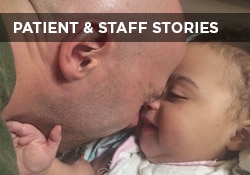This website uses cookies so that we can provide you with the best user experience possible. Cookie information is stored in your browser and performs functions such as recognising you when you return to our website and helping our team to understand which sections of the website you find most interesting and useful.

Susan E. Mazer, Ph.D. Blog
Thoughts and ideas on healthcare
Hi, and welcome to my blog! I'm Susan E. Mazer -- a knowledge expert and thought leader on how the environment of care impacts the patient experience. Topics I write about include safety, satisfaction, hospital noise, nursing, care at the bedside, and much more.
ICU Anxiety: When the Sounds of Silence Become Hospital Noise
February 24, 2017
 Hospital noise is a patient satisfaction indicator. It’s also is the number one cause of sleep deprivation.
Hospital noise is a patient satisfaction indicator. It’s also is the number one cause of sleep deprivation.
We don’t know how patients define noise, what differentiates a “noise” from a “sound” — other than one is annoying and the other may be informing or communicating.
This is why the resolution of hospital noise has not been easy, or sustainable.
If we call “noise” bad and “sound” neutral, meaning neither good nor bad, we still may not arrive at a way to control it.
However, what is equally true is that silence is not the answer. In fact, there are sounds of silence that originate in the thinking and worrying that keep patients and families from enjoying a good night’s sleep.
ICU Anxiety Contributes to Disturbed Sleep
Research has pointed to several factors about disturbed sleep for ICU patients. The usual disruptors are poorly scheduled vital sign checks and medication administration.
Turning on the lights to do these checks arouses patients enough to make it even more difficult for them to get back to sleep. Medications and symptoms of their condition also may make sleeping difficult.
A 2016 study done by a group of university-based sleep experts indicated that only 32% of providers had sleep-promoting protocols. More than 75% of the 1,225 respondents said that their ICU patients experience poor sleep and that this had a negative impact on outcomes.
The reasons stated included complications of mechanical ventilation, delirium, a longer length of stay, and other factors.
The study concluded that “highlighted discordant provider perceptions and practices surrounding sleep in the ICU, as well as a possible lack of available evidence-based guidelines for promoting sleep in the ICU, has continued to leave the problem unresolved.”
Still, what was not on the list was patients’ experiences of conscious fear about their future, the loss of self that is caused by being a patient, and the self-cycling mind chatter that prevents rest.
In a dark, relatively quiet room, frightened patients have limited resources to help them get past their own continuing cycle of fear. No one to talk to, few positive distractions, and a clock that moves even slower.
Suffering is all about those fears. It is in the isolation that comes at night that angst plays its painful tune in ways none of us who are not the patient can understand.
Positive Distractions Do More Than Just Distract
Distraction theory suggests that thinking about something other than what is painful relieves suffering, in part if not in whole. And, generally, it does this for a period of time when the object of distraction is engaging.
As Roger Ulrich’s work points out, positive distractions do more than just distract. They give respite from the ongoing self-talk that pulls on the patient.
For this reason, we created a midnight starfield in our C.A.R.E. Programming for overnight use. The music attracts the listener and masks erratic sounds. The moving starfield with stunning nebula, provide a place to see and think. It promotes a quieter, peaceful nighttime experience.
Being sensitive to an adult patient in ICU may be about remembering why children are read a bedtime story, sung a lullaby, or offered a ritual to help them transition into sleep. There is nothing about ICU that, on its own, comforts patients to allow them to fully rest.
We must intentionally and purposefully create a restful environment for ICU patients and remember that the sounds of silence are best designed and programmed for healing.
P.S. If you like this post, please do me a favor and share on LinkedIn, Twitter, Facebook, etc. Also to get automatic notices when a new post is published, subscribe (upper right). No spam – just great content. Thanks!










